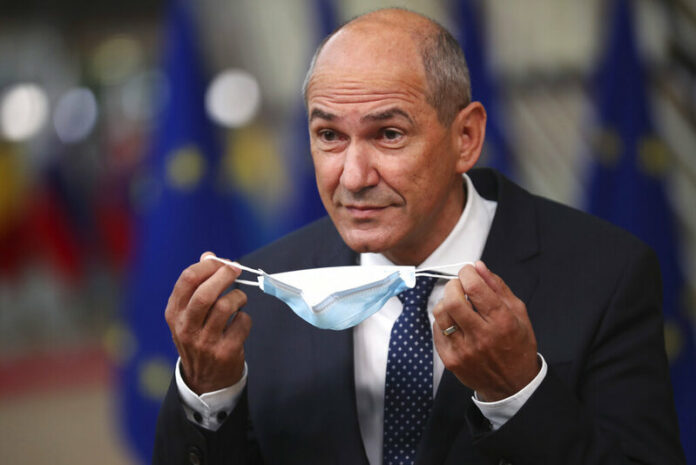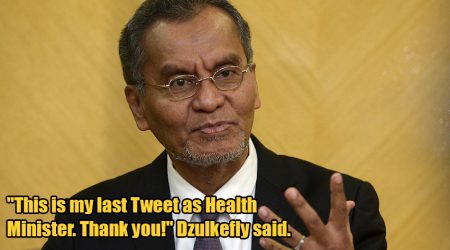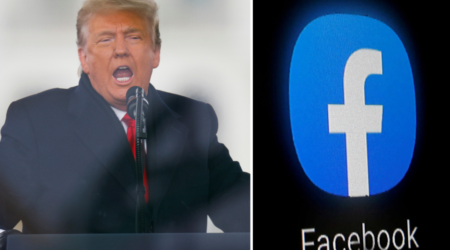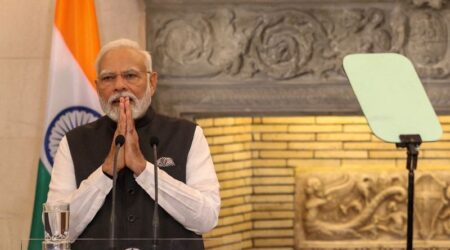European Union braces for Slovenia’s unorthodox presidency

Slovenia takes over the European Union presidency with its prime minister in the focus because of his squabbles with Brussels, close alliance with populist Hungarian leader Viktor Orban and increasingly autocratic policies which cast doubt on the small country’s credibility to lead the 27-nation bloc.
Although the rotating six-month EU Council presidency, which Slovenia assumes from Portugal on Thursday, is mostly a bureaucratic task, it comes amid the bloc’s painful post-COVID-19 recovery, the stalled EU enlargement process and concerns that the leadership role could be used by the government to further obstruct media freedoms in Slovenia and elsewhere in Europe.
In May, Slovenian Prime Minister Janez Jansa narrowly survived an impeachment motion in the Slovenian parliament filed by opposition parties which accused him of clamping down on the press and mismanaging the pandemic by failing to provide enough vaccines for the picturesque Alpine state of about 2 million people.
The country at the EU helm prepares meeting agendas and calendars. It’s expected to put national politics aside and play the role of an “honest broker” with the aim of fostering agreements between EU member states.
Slovenia, which also held the presidency in early 2008, takes over just as the EU prepares to start distributing its massive coronavirus recovery fund aimed at reviving European economies from the damage inflicted by restrictions imposed to contain the disease.
When she arrives in Slovenia later this week for a handover ceremony, European Commission President Ursula von der Leyen is expected to officially approve Slovenia’s national plan for access to the fund — an event likely to be the focal point of the visit to Ljubljana by the EU’s executive branch.
But EU officials will be watching carefully to see how Jansa handles the thorny issue of democratic standards. Hungary and Poland, notably, are embroiled in technical and legal proceedings over allegations that their nationalist governments are undermining the rule of law.
Jansa’s silence when most EU nations were criticizing Orban at a summit last week over a new Hungarian law seen as thwarting LGBT rights for minors will not have gone unnoticed in Brussels.
In its official presidency program, Slovenia says it plans to “focus our efforts on strengthening the rule of law as one of common European values.”
“Our aim is to promote a culture of the rule of law throughout the EU and, through inclusive debate, enable member states to learn from each other’s experiences,” the program says, as well as to show how it “can be further strengthened in full respect of national constitutional systems and traditions.”
Faris Kocan, a foreign policy analyst at the Center of International Relations in Ljubljana, said that Slovenia’s presidency is an important test for the EU because of the rising undemocratic tendencies in Slovenia and among some other member states, such as Hungary and Poland.
“If we see the priorities of the Slovenian presidency, you can see that they are in line with the European Union — resilience, the economic recovery, digital transformation and green technologies,” he said.
“But, what is this ‘European way of life’ promoted by Slovenia’s presidency? The question is what it actually means. Are those tolerance, human rights and liberties, or are those values of some past times and undemocratic regimes?” Kocan asked.
At a presidency event in Ljubljana over the weekend, European Council President Charles Michel said only that the EU “is founded on democratic values, values of freedom, of the state of law because that’s the best guarantee to ensure the dignity of all.”
“Diversity, tolerance and respect are strengths, never weaknesses,” he said, without going into detail or mentioning any EU country by name.
Thousands of people rallied in Slovenia earlier this month, demanding that the government resign and an early election be held over what they said were eroding democratic standards.
During its presidency, Slovenia also plans to make progress on a new asylum system one of its priorities. But the issue is blocked by a yearslong dispute over who should take responsibility for migrants arriving in Europe and whether other EU countries should be obliged to help.
Unable to break the deadlock, the outgoing Portuguese presidency has focused on outsourcing the EU’s migration policy by building relationships with countries, mostly in Africa, that people leave or cross to get to Europe.
Slovenia’s presidency is likely to be a dynamic affair because of Jansa’s unorthodox style of leadership that included his staunch support for former U.S. President Donald Trump during the last American election. Jansa congratulated Trump on his “victory” long before the official results were published.
In Slovenia, Jansa is nicknamed “Marshal Twito” — a pun playing on the name of the former Yugoslav dictator Marshal Josip Broz Tito —because of his frequent use of Twitter. Just as Trump did before he was banned from the social media platform, Jansa is also known to use Twitter to attack his political opponents and make unfounded claims.












Leave a Reply